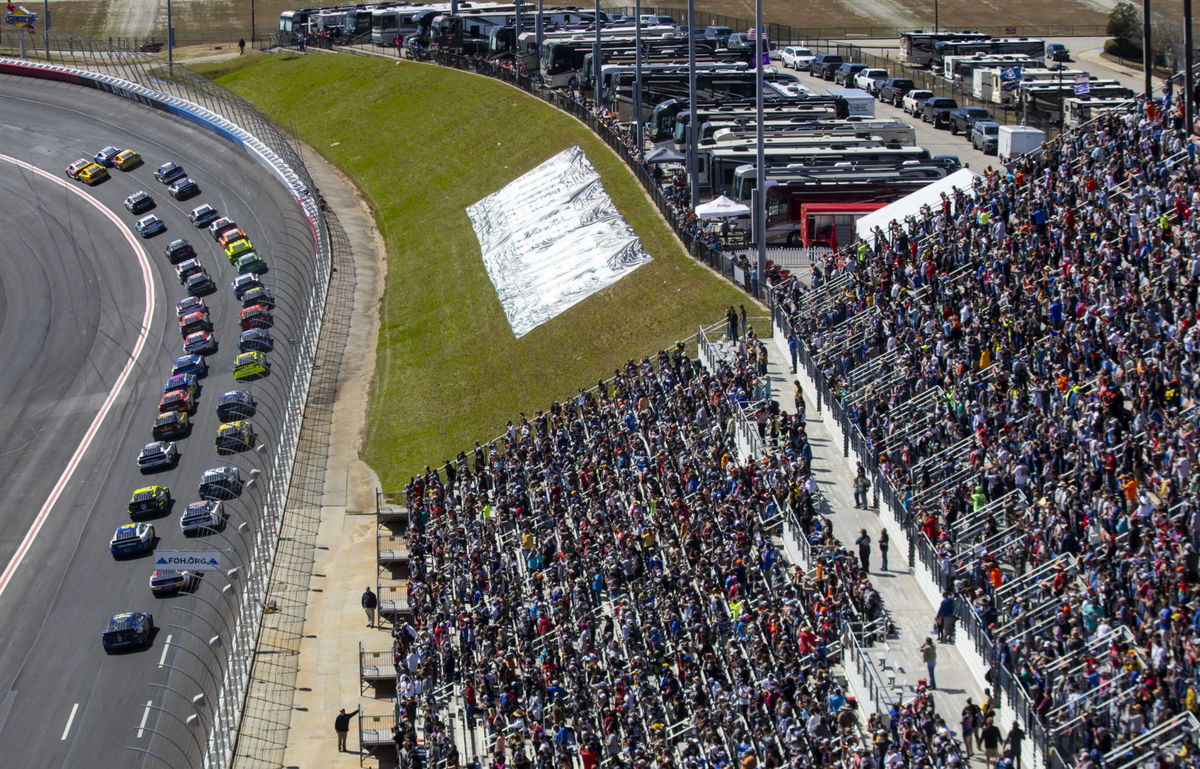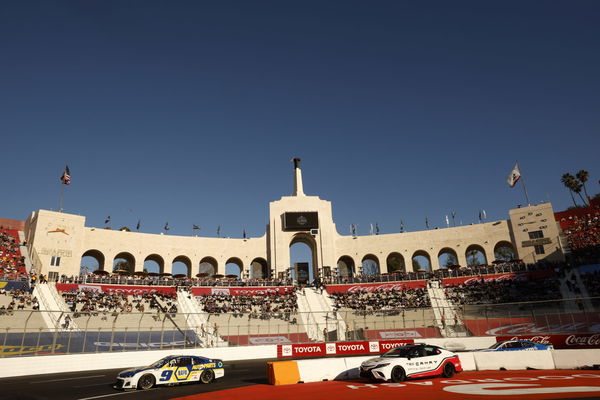
Imago
Mar 20, 2022; Hampton, Georgia, USA; Fans in the crowd look on as the field of NASCAR Cup Series drivers race into turn one to begin the Folds of Honor QuikTrip 500 at Atlanta Motor Speedway. Mandatory Credit: Mark J. Rebilas-USA TODAY Sports

Imago
Mar 20, 2022; Hampton, Georgia, USA; Fans in the crowd look on as the field of NASCAR Cup Series drivers race into turn one to begin the Folds of Honor QuikTrip 500 at Atlanta Motor Speedway. Mandatory Credit: Mark J. Rebilas-USA TODAY Sports
So far this season, NASCAR is experiencing a clear comeback. A comeback in terms of viewership numbers, something which is incredibly important for not only the overall appeal of the sport but in the longer run, for the finances as well.
Watch What’s Trending Now!
NASCAR races have attracted more viewers this year than NBA, Olympics, and other ‘competition’.
However, that run might soon come to an end, or at least if not end, the gap between the top and the second most viewed sport might get progressively narrower.
ADVERTISEMENT
This is because Formula 1 is back. And F1, in its very first race of the season, became the second-most viewed sporting event.
While NASCAR registered 4 million viewers for the race in Atlanta, F1 had a viewership of 1.3 million for the Bahrain Grand Prix. Trailing way behind these two was IndyCar, with 950,000 viewers for the race in Texas.
Motorsports viewership in America last weekend:
1) NASCAR Cup: 4.003 million viewers
2) Formula 1: 1.353 million
3) IndyCar: 954,000🔳 However, @F1 nearly matched @NASCAR in the 18-49 demographic, with NASCAR earning 716,000 viewers in that category and F1 getting 656,000. pic.twitter.com/03XIFuLGMK
— Adam Stern (@A_S12) March 22, 2022
ADVERTISEMENT
But what’s concerning for the stock car racing series is a specific demographic of viewers. And that is the one with the age group of 18-49.
In that category, NASCAR registered around 710,000 viewers, while F1 followed close behind with their new cars and viewership of 650,000.
ADVERTISEMENT
NASCAR needs to focus on how it portrays itself according to Chase Elliott
In an interview last year, Hendrick driver Chase Elliott was asked how should NASCAR position itself amidst the growing threat of competition from F1. This was something the 2020 Cup champion believes doesn’t have a right or wrong answer.
“The most important thing is how do you want your sport to be portrayed to the public. Netflix put that deal together with F1, and then I will say that was a very respectful, very intense way that people could watch and be like, Holy cow, there’s a lot that goes into this,” Elliott elaborated.
ADVERTISEMENT
“These guys aren’t just driving around the track as fast as they can. This isn’t funny. This is legit.”
Top Stories
Adrian Newey’s Motorsport Masterpiece: RB17 vs Aston Martin Valkyrie, Which One Is Better?

Who Is Oscar Piastri’s Father, Chris Piastri? Co-Founder of Multibillion Dollar Automotive Company

3 Years After His Death, Niki Lauda’s Wife Brutally Disrespects Him to Initiate $32,000,000 Battle Against Own Children

Carlos Sainz & Ex Girlfriend Isa Hernaez Issue Contrasting Statements to Stir the Pot After Unexpected Breakup

Who Is Canadian F1 Billionaire Lawrence Stroll’s Daughter & Heiress Chloe Stroll?


Getty
LOS ANGELES, CALIFORNIA – FEBRUARY 06: Chase Elliott, driver of the #9 NAPA Auto Parts Chevrolet, drives during the NASCAR Cup Series Busch Light Clash at the Los Angeles Memorial Coliseum on February 06, 2022 in Los Angeles, California. (Photo by Chris Graythen/Getty Images)
Chase Elliott believes a mix of good decisions, some intentional, some down to pure luck, have contributed to their rapid rise in the US.
ADVERTISEMENT
“I don’t know what’s led to it, but whatever started that process of those right decisions. Maybe luck of the draw of having some great racing this year with some extra eyeballs kind of at the same time — a right sequence of events for them,” he said.
“But they’ve got a good thing going.”
Also Read: NASCAR Tries to Emulate the F1 Model With Crucial Rule Change
ADVERTISEMENT
ADVERTISEMENT
ADVERTISEMENT
ADVERTISEMENT

